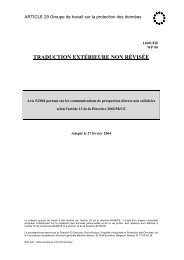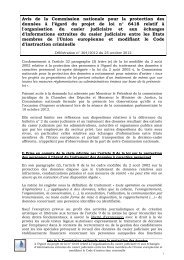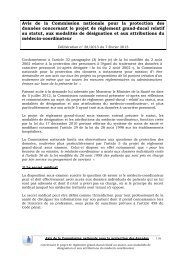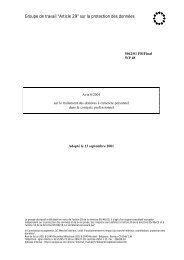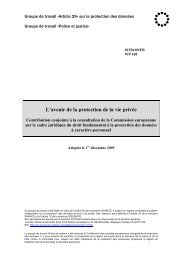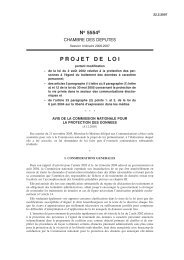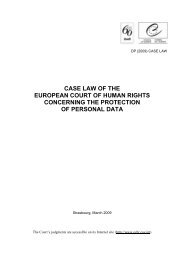case law of the european court of human rights concerning the ...
case law of the european court of human rights concerning the ...
case law of the european court of human rights concerning the ...
Create successful ePaper yourself
Turn your PDF publications into a flip-book with our unique Google optimized e-Paper software.
not, strictly speaking, to correct an actual initial error but to bring <strong>the</strong> document up to date so as to<br />
reflect <strong>the</strong> applicant’s present position. Fur<strong>the</strong>rmore, numerous <strong>court</strong>s <strong>of</strong> first instance and <strong>court</strong>s <strong>of</strong><br />
appeal have already ordered similar insertions in <strong>the</strong> <strong>case</strong> <strong>of</strong> o<strong>the</strong>r transsexuals, and <strong>the</strong> procureur’s<br />
<strong>of</strong>fice has hardly ever appealed against such decisions, <strong>the</strong> great majority <strong>of</strong> which have now<br />
become final and binding (see paragraph 23 above). The Court <strong>of</strong> Cassation has adopted a contrary<br />
position in its <strong>case</strong>-<strong>law</strong>, but this could change (see paragraph 24 above).<br />
It is true that <strong>the</strong> applicant underwent <strong>the</strong> surgical operation abroad, without <strong>the</strong> benefit <strong>of</strong> all <strong>the</strong><br />
medical and psychological safeguards which are now required in France. The operation never<strong>the</strong>less<br />
involved <strong>the</strong> irreversible abandonment <strong>of</strong> <strong>the</strong> external marks <strong>of</strong> Miss B.’s original sex. The Court<br />
considers that in <strong>the</strong> circumstances <strong>of</strong> <strong>the</strong> <strong>case</strong> <strong>the</strong> applicant’s manifest determination is a factor<br />
which is sufficiently significant to be taken into account, toge<strong>the</strong>r with o<strong>the</strong>r factors, with reference<br />
to Article 8 (art. 8).<br />
(ii) Change <strong>of</strong> forenames<br />
56. The applicant pointed out that <strong>the</strong> <strong>law</strong> <strong>of</strong> 6 Fructidor Year II (see paragraph 22 above) prohibited<br />
any citizen from bearing a surname or forename o<strong>the</strong>r than those recorded on his or her birth<br />
certificate. In <strong>the</strong> eyes <strong>of</strong> <strong>the</strong> <strong>law</strong>, her forename was <strong>the</strong>refore Norbert; all her identity documents<br />
(identity card, passport, voting card, etc.), her cheque books and her <strong>of</strong>ficial correspondence<br />
(telephone accounts, tax demands, etc.) described her by that name. Unlike in <strong>the</strong> United Kingdom,<br />
whe<strong>the</strong>r she could change her forename did not depend on her wishes only; Article 57 <strong>of</strong> <strong>the</strong> Civil<br />
Code made this subject to judicial permission and <strong>the</strong> demonstration <strong>of</strong> a "legitimate interest"<br />
capable <strong>of</strong> justifying it (see paragraph 22 above). Miss B. knew <strong>of</strong> no decision which had regarded<br />
transsexualism as giving rise to such an interest. In any event, <strong>the</strong> Libourne tribunal de grande<br />
instance and <strong>the</strong> Bordeaux Court <strong>of</strong> Appeal had refused to allow her <strong>the</strong> forenames Lyne Antoinette<br />
(see paragraphs 13-15 above). Finally, <strong>the</strong> status <strong>of</strong> informally adopted forenames was highly<br />
uncertain.<br />
The Commission agreed in substance with this argument.<br />
57. The Government maintained, on <strong>the</strong> o<strong>the</strong>r hand, that <strong>the</strong>re was ample favourable <strong>case</strong>-<strong>law</strong> on <strong>the</strong><br />
point, supported by <strong>the</strong> public prosecutor’s <strong>of</strong>fices. It merely required that a "neutral" forename such<br />
as Claude, Dominique or Camille was chosen; <strong>the</strong> applicant had, however, requested forenames<br />
which were exclusively female.<br />
In addition, many people frequently made use <strong>of</strong> an informally adopted forename ("prénom<br />
d’usage") which differed from that recorded in <strong>the</strong>ir birth certificate. The Government conceded,<br />
however, that this practice had no legal validity.<br />
58. The judgments supplied to <strong>the</strong> Court by <strong>the</strong> Government do indeed show that non-recognition <strong>of</strong><br />
<strong>the</strong> change <strong>of</strong> sex does not necessarily prevent <strong>the</strong> person in question from obtaining a new<br />
forename which will better reflect his or her physical appearance (see paragraph 23 above).<br />
However, this <strong>case</strong>-<strong>law</strong> was not settled at <strong>the</strong> time when <strong>the</strong> Libourne and Bordeaux <strong>court</strong>s gave<br />
<strong>the</strong>ir rulings. Indeed, it does not appear to be settled even today, as <strong>the</strong> Court <strong>of</strong> Cassation has<br />
apparently never had an occasion to confirm it. Moreover, <strong>the</strong> door it opens is a very narrow one, as<br />
only <strong>the</strong> few neutral forenames can be chosen. As to informally adopted forenames, <strong>the</strong>y have no<br />
legal status.<br />
To sum up, <strong>the</strong> Court considers that <strong>the</strong> refusal to allow <strong>the</strong> applicant <strong>the</strong> change <strong>of</strong> forename<br />
requested by her is also a relevant factor from <strong>the</strong> point <strong>of</strong> view <strong>of</strong> Article 8 (art. 8).<br />
43



